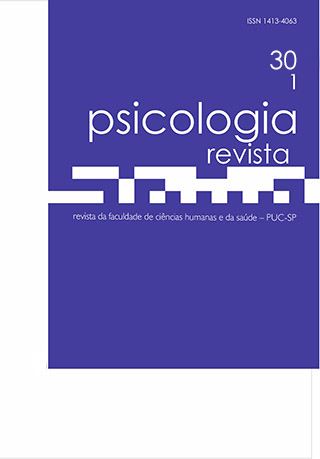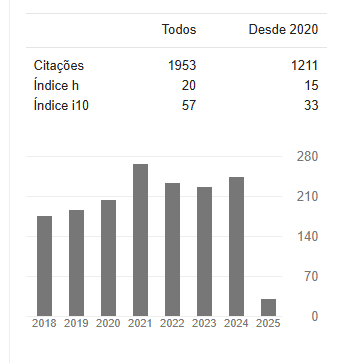MBTI Profile and the Four Temperament Typology
possible relationships between management and non-management positions
DOI:
https://doi.org/10.23925/2594-3871.2021v30i1p193-225Keywords:
MBTI, Psychological types, Temperaments, Profile for management positionsAbstract
The present research aims to evaluate the existence of profiles from personality and temperament which can be associated with the occupants of management positions. In order to understand this relation, a documentary analysis has been made using 240,233 MBTI protocols, which represents the database of the company that owns the tool in Brazil from the period of 2007 to 2015. The theory of David Keirsey was used for this purpose and according to the characteristics of this study and the rules of the Ethics Committee, only the express authorization of the company was needed. The results indicate the ESTJ (Extroverted, Sensory, Rational, Judging) and ISTJ (Introverted, Sensory, Rational, Judging) personality typologies and the Guardian temperament are the ones that stand out the most for all types of positions and also 12.55% of the people analyzed in protocols occupied some management position. The conclusion presented there are no typology or temperament profiles that differentiate people who occupy management positions from those who do not. However, there are typologies and temperaments more frequently observed for professionals in different positions.
References
Avolio, B. J & Walumbwa, F.O. (2014). Teoria, pesquisa e prática da liderança autêntica: passos dados e passos que permanecem. Em DV Day (Ed.), The Oxford handbook of Leadership and Organisation (pp. 331-356). New York, NY: Oxford University Press.
Berens, L, V. (1998). Understanding yourself and others, an introduction to temperament. California: Telos Publications.
Bradbury, H., & Lichtenstein, B. (2000). Relationality in organizational research: Exploring the space between. Organization Science, 11(5), 551-564.
Briggs, K.C.; Myers, I.B. & Machado JR., P.P. (2008). MBTI-Myers-Briggs Type Indicator. Editora IDH Instrumentos de Desenvolvimento Humano.
Calegari, M. L. & Gemignani, O. (2206). Temperamento e carreira: desvendando o enigma do sucesso. São Paulo: Summus.
Carapeto, C. & Fonseca, F. (2006). Administração Pública: Modernização, qualidade e inovação. Lisboa: edições Silabo.
Conselho Federal de Psicologia – CFP (2019). A turma da psicologia: Comissão Consultiva em Avaliação Psicológica. CCPA, Gestão 2017-2019. Disponível em: < https://satepsi.cfp.org.br/docs/cartilha_psicologia.pdf>. Acesso 20 out 2020.
Couto, G.; Bartholomeu, D. & Montiel, J. M. (2016). Estrutura interna do Myers Briggs Type Indicator (MBTI): evidência de validade. Aval. psicol. [online]. 2016, vol.15, n.1, pp. 41-48.
Couto, G.; Briggs, K. C.; Myers, I. B. & Holer, A. (2010). MBTI - Myers-Briggs Type Indicator: Inventário de Tipos Psicológicos. São Paulo: Fellipelli Instrumentos de Diagnóstico e Desenvolvimento Organizacional.
Fleenor, J.W. (1997). The relationship between the MBTI and measures of personality and performance in management groups. In C. Fitzgerald & L. Kirby (Eds.), Developing leaders: Research and applications in psychological type and leadership development (pp. 115-138). Palo Alto, CA: Davies-Black.
Freitas, M. E. (2005). Cultura organizacional: Identidade, Sedução e Carisma? 4ª. Ed. Rio de Janeiro: Editora FGV.
Gardner, W. L., & Martinko, M. J. (1996). Using the Myers-Briggs type indicator to study managers. A Literature Review and Research Agenda Journal of Management 22(1), 45-83.
Gattai, M.C.P.(2014). Dinâmica de Grupo: da teoria à pratica. São Paulo: Editora Senac, 2014.
Gil, A. C. (2019). Como elaborar projetos de pesquisa. São Paulo: Atlas.
Gil, A. C. (2006). Métodos e Técnicas de Pesquisa Social. 5ª edição. São Paulo: Atlas, 2006.
Hernandez, M., Eberly, M. B, Avolio, B. J, & Johnson, M. D (2011). The loci and mechanisms of leadership: Exploring a more comprehensive view of leadership theory. The Leadership Quarterly, 22(6), 1165-1185
Hirsh, S. K. & Kummerow, J. M. (2011). Introduction to Type® in Organizations. 3ª edição. Califórnia: CPP, Inc.
Jung, C. G. (2001). Fundamentos da Psicologia Analítica. Vol. XVIII/1. Petrópolis: Vozes.
Jung, C. G. (2002). Psicologia do Inconsciente. Vol. XVII/1. Petrópolis: Vozes.
Keirsey, D. (2015). The four temperaments. Disponível em: <http://keirsey.com/default.aspx>. Acesso em 27 mai.
Kotter J. P. (2000). Afinal o que fazem os líderes? a nova face do poder e da estratégia. Rio de Janeiro (RJ): Campus.
Fellipelli (2015). Instrumentos de diagnósticos e desenvolvimento organizacional. Manual - Programa de qualificação: Instrumento MBTI.
Marconi, M. A. & Lakatos, E. M. (2019). Fundamentos de Metodologia Científica. 8. Ed. São Paulo, Atlas.
Mintzberg, H. (2003). Burocracia Profissional. In: Criando Organizações Eficazes. 2. Ed. São Paulo, SP: Editora Atlas.
Myers, I. B. (2011). Introduction to Type®. 6ª edição. California: CPP, Inc.
Myers, I. B. & Myers, P. B. (1997). Ser humano é ser diferente: valorizando as pessoas por seus dons especiais. São Paulo: Gente.
Olbrzymek, J. R. (2017). Comportamento, clima e cultura organizacional. Indaial: UNIASSELVI.
Pasquali, L. (1997). Psicometria: teoria e aplicações. Brasília: Editora Universidade de Brasília.
Pittenger, D. J. (1993), Measuring the MBTI and coming up short. Journal of Career Planning and Employment, 54, 48-53.
Ramos, L. M. A. (2005). Os tipos psicológicos na psicologia analítica de Carl Gustav Jung e o inventário de personalidade “Myers-Briggs Type Indicator (MBTI)”: contribuições para a psicologia educacional, organizacional e clínica. ETD – Educação Temática Digital, Campinas, v.6, n.2, p.137-180, jun. 2005 - ISSN: 1676-2592.
Robbins, S. P., Judge, T. A., & Sobral, F. (2010). Comportamento organizacional: teoria e prática no contexto brasileiro. São Paulo: Pearson.
Sato, J. (2005). Construction of Jung Psychological Types Scale. Shinrigaku Kenkyu ; 76(3): 203-10, Aug.
SATEPSI (2020). Testes favoráveis. Recuperado a 27 de outubro de 2020 em https://satepsi.cfp.org.br/testesFavoraveis.cfm#:~:text=Testes%20Psicol%C3%B3gicos%20Favor%C3%A1veis%3A%20s%C3%A3o%20aqueles,parecer%20favor%C3%A1vel%20emitido%20pelo%20CFP.
SBCOACHING (2020). MBTI: o que é, como funciona, benefícios desse teste. Recuperado a 07 de julho de 2021 em https://www.sbcoaching.com.br/mbti/.
Strelau, J. (1998). Temperament: A Psychological Perspective. New York: Plenum.
Tanure, B.; Mota-Santos, C. ; Carvalho Neto, A. & Nunes, S. C. (2015). O tipo psicológico dos altos executivos brasileiros e a percepção de estresse: onde os “fracos” não têm vez. BASE – Revista de Administração e Contabilidade da Unisinos 12(1):40-51, janeiro/março.
Tobacyk, J. J; Livingston, M. M. & Robbins, J. E.(2008). Relationships between Myers-Briggs type indicator measure of psychological type and neo measure of big five personality factors in Polish University students: a preliminary cross-cultural comparison. Psychol Rep ; 103(2): 588-90, Oct.
Downloads
Published
How to Cite
Issue
Section
License
Copyright (c) 2021 Maria Cristina Pinto Gattai, Marina Vavassori Camanho

This work is licensed under a Creative Commons Attribution 4.0 International License.














